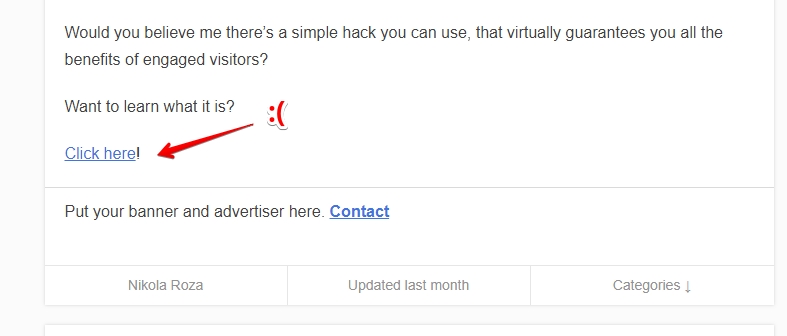I think we can all agree- links are not going anywhere.
Links made Google’s algorithm the raging success it is today, and they’re so baked into the ranking process, that no, they’re not disappearing any time soon.
But neither should we, the webmasters. We shouldn’t give up on trying to rank our sites. Newbies in the industry should follow tips on SEO for starters and wee need to adapt and be creative with our SEO efforts.
Oh, and thrive- we also need to do that:)
This article is all about a certain way of adapting and thriving i.e., making links super strong so you need less of them to rank.
Let’s go!
Table of Contents - What is covered in this post
4 advanced ways of making links stronger
Note: this process works for both internal and external links and helps improve your SEO performance
While true backlinks are much stronger than internal links, it still pays handsomely to super optimize the latter.
It’s just plain good sense. It’s good SEO
#1- Anchor text- make it descriptive
This is fairly known by this point, and really obvious. but it bears repeating.
Too often, with guest posting for example, people link to their site using generic keywords like “this website” “click here” “go here”.
These anchors are not good!. They’re not helpful at all.
They don’t send relevancy signals to Google about what you target page is about. Thus you miss a valuable opportunity to strengthen that link and the page you’re linking to.
But who am I to say this?
Take a look at this link in the post about best keyword research tactics (the first ever post I contributed to EnstineMuki.com)

Yes, I’m still kicking myself over it- but you don’t have to.
Bottom line– make your anchor text descriptive, keywords included.
Also did you see how in the internal link above I used keyword-rich anchored text? That is good internal link optimizing and it’s penalty-proof– because they’re internal links.
#2- Use relevant words around the link
When linking internally and externally and you control the link, again like in guest posting, it pays to spend a minute and place meaningful words around the anchor text.
When I say a meaningful, I mean keyword-rich.
For example, if you have a lifestyle blog than you definitely need a list of lifestyle blog post ideas to get those lifestyle ideas flowing.
See that? That link has keyword-rich anchor text and is made even stronger because there are relevant words around the link.

Note: This might not have any bearing now, but the advice is sound and is based on a recent Google patent which shows where they’re heading me the future. So you’re doing this now to prepare for what’s to come.
#3- Use hub pages and “Topical Rank”
Hub paged are basically resource pages, and topical rank is a part of Page Rank algorithm that flows through thematically related pages.
For example: if you have an article about baking cookies and you get a link from a resource page that lists resources about baking cookies, that the link will flow bot PR and TR.
And that will make the link super relevant and strong.
Does this work for internal links?
Yes, it does.
For example:
This is an article about advanced internal linking. And that article links to the one about semi-advanced link building.
So, that internal link from page A to page B is super relevant and strong because both pages are about internal links.
Compare that to this page linking to those two articles about internal linking. Much weaker; because this page is not about internal linking.
Get it?
#4- Use phrase-based indexing
This is Google’s way to determine link relevancy by looking at all the words page A contains and then checking to see how many of those words page B has, and how many topics are shared between the two pages.
I know this seems clunky to us humans because we can just take a glance and see if the pages are related; but Google is a machine and can’t do that. Plus they have to calculate how much are pages related to each other and how much weight to give to links on those pages
For example: If I link from this page to Lisa’s on-page SEO checklist, that link will count pretty well because because there are many words shared between the pages:
- SEO
- internal links
- internal linking
- Keywords
- Keyword research
- external links
- backlinks…
So this is a really good link that’ll help with her traffic quite a bit.
And had I linked from this page to a page about baking cookies that link would’ve probably be very weak.
Not useless though, especially if it had descriptive anchor text, but it’d be much weaker.
So, always try to link relevantly, both internally and externally; and to get a firmer grasp of this concept, I advise you to read Enstine’s Semantic SEO guide. I did and it opened my eyes in some regards.
- https://enstinemuki.com/semantic-seo-improves-anking/
Conclusion
Links aren’t going anywhere- they’re are the (foreseeable) future.
And the smart thing to do today is future proof your links so they work tomorrow and work even better the day after tomorrow, as Google gets smarter and smarter.
And getting relevant links from relevant sites and using a few techniques I outlined here will get you really far, that’s a promise, from me to you.
Have a comment, something to add?
Do it below, and… thank you:)
Comments are closed.